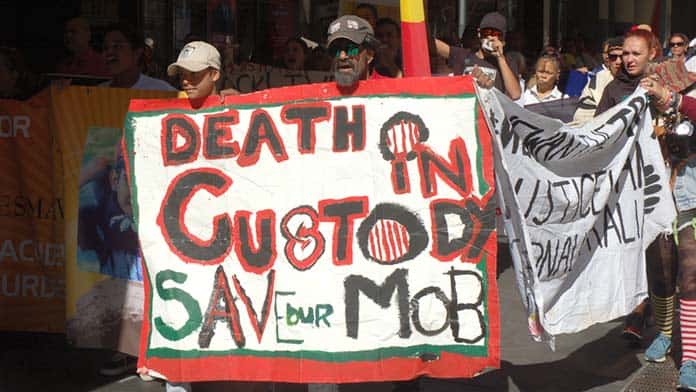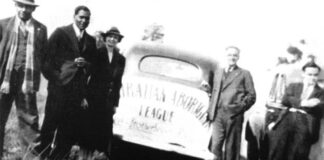Aboriginal and Torres Strait Islander people are the most incarcerated group on the face of the planet.
When mass Black Lives Matter protests were on the streets in 2020, Albanese said these “horrific” statistics “diminish us all”.
But since Albanese took office, there has been an unprecedented increase in both the number of Indigenous prisoners and the rate of over-representation.
In the first quarter of 2022 there were 12,556 Indigenous adults in prison, making up 31 per cent of the total prison population. Over the same period in 2024, there were a record 15,070 Indigenous adult prisoners, now 35 per cent of those held behind bars.
Indigenous youth now make up 59 per cent of the youth prison system and are an appalling 29 times more likely than their non-Indigenous counterparts to be locked up.
These shocking figures are the result of an intensifying, racist law and order agenda being driven by Labor governments in the middle of cost-of-living and housing crises that are hitting Black people the hardest.
Albanese has refused to take any action to create Black employment, deal with the mass homelessness or fund self-determining programs. Aboriginal legal services have suffered cuts and had to shut down services.
Labor initially put all its focus on the showpiece “Voice” referendum. Rather than fight Dutton’s rabid racism through the campaign, Labor emphasised that the Voice would have no real power.
Following the disastrous campaign loss, Albanese wiped his hands, telling 2BG, “I’m not Indigenous, so it wasn’t a loss to me.”
And in the wake of the Voice defeat, Labor has shifted even further to the right, now saying Indigenous policy initiatives must have bipartisan support.
State law and order agenda
In August, the Country Liberal Party won a landslide victory in the NT election.
The party ran a vicious campaign, promising to lower the age of criminal responsibility to 10 and reintroduce spit hoods, banned due to their extreme risk and use in torturing Indigenous youth.
But the road to CLP victory was paved by NT Labor, who oversaw a punitive law and order agenda when in power.
Labor refused to seriously deal with the appalling poverty, disempowerment and racism suffered by Indigenous people across the NT, the root causes of the youth crime crisis in urban centres like Alice Springs.
Instead, they beefed up police numbers and powers, tightened bail laws and brought in an extreme youth curfew.
Labor promised more punishment if elected. They could never defeat the CLP on this terrain.
State Labor governments across the country are running the same agenda. In Queensland, Labor is trying to outbid the Liberals with “tough on crime” policies in the lead up to the October election.
Queensland Labor has already funded new detention centres, suspended the state’s Human Rights Act to pass youth bail laws and removed clauses which stipulate youth detention should be a “last resort”.
A new report by the Inspector of Detention Services in August revealed Black youth in North Queensland’s Cleveland youth prison had been placed in isolation for more than 70 days straight and held overnight in tiny concrete rooms with no running water or toilets.
In WA, August saw another death of an Indigenous young person in the notorious Banksia Hill detention centre, the second within a year.
Meanwhile, at the federal level, Labor is continuing to ignore the deep crisis of murdered and missing Aboriginal women and girls, despite the handing down of a report in August that followed a major parliamentary inquiry.
Durambul journalist and scholar Amy McQuire slammed the lack of action from the inquiry and the failure of media to report on the crisis: “The message that is sent to Aboriginal women is this country does not care.”
The inquiry documented shocking violence at the hands of perpetrators and the state, along with systematic failings of police and other agencies to investigate the deaths and disappearances of Aboriginal women.
Sixteen per cent of homicide victims and 20 per cent of missing women are recorded as Indigenous, a serious undercount given the evidence presented of disgracefully inadequate and incomplete data.
The inquiry heard many stories of the way that Aboriginal women targeted for violence found themselves criminalised and incarcerated, or suffered the forced removal of their children.
Many of the families of disappeared Aboriginal women who presented to this inquiry have fought for years for justice, only to be slapped down by silence and inaction.
Their courage needs to inspire a renewed movement for Aboriginal rights that can get back to the streets and take this racist system head on.
By Paddy Gibson






